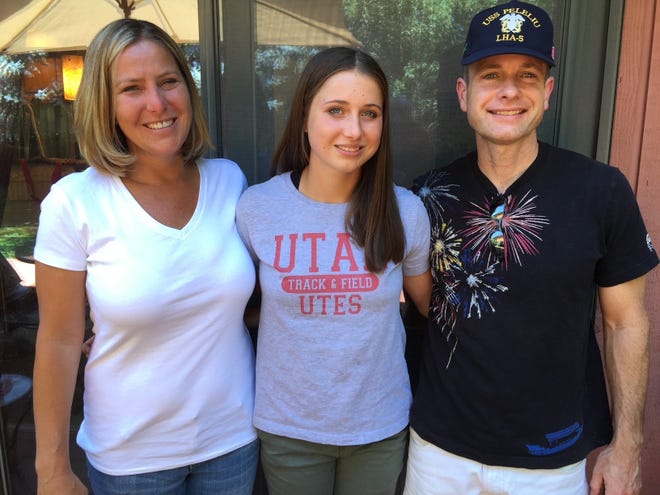During this summer, a team of students from MIT embarked on a journey to the sou …
Parents of murdered college student advocate for campus safety nationwide
Jennifer Livingstone

During the two-week period before her murder on October 22, 2018, Lauren McCluskey, a student-athlete at the University of Utah, reported her attacker to campus police more than 20 times.
Despite receiving no response from those in positions of authority, Lauren’s mother stated that her daughter persisted in reporting the attacker again and again. One aspect that Jill McCluskey, Lauren’s mother, wants people to know about her daughter is that Lauren never gave up.
“She was brave,” declared Jill McCluskey. “She advocated for herself when no one else would.”
Following the tragic murder of their daughter five years ago, Matt and Jill McCluskey have become advocates for campus safety. They have established the Lauren McCluskey Foundation in honor of Lauren, using the $13.5 million settlement they received from a lawsuit against the University of Utah. The foundation plans to release a campus safety scorecard within the next year, ensuring that universities are held accountable to optimal safety measures.
“There is a ton of grief after you lose a child and part of my response to that grief was to try to make things better, and that was really a motivation,” said McCluskey. “I think if you’re doing something positive, and for other people, I think it really helps you feel better and feel more hopeful about the future.”
The McCluskeys are primarily focused on changing the prevailing culture surrounding campus safety. One of their top priorities is the campus safety scorecard. Rather than simply adhering to the Clery Act’s requirements, which necessitates the reporting of campus crime data and the provision of support for victims of violence, the scorecard will go beyond these measures. It will also assess the policies and procedures implemented by universities to enhance campus safety.
A Measure of Safety for Families
“We want to make sure that the universities are adopting best practices and doing the right things,” emphasized McCluskey. “This is so important to us because our daughter was murdered in 2018 and there were so many errors, and not best practices adopted that could have saved her life.”
To develop the scorecard, the McCluskeys are collaborating with experts from Washington State University and Stanford University. Edwin Gianini, an undergraduate student from WSU’s School of Economic Sciences, has been involved in gathering base data on students’ perceptions of campus safety at Washington State. Gianini, now a volunteer for the Lauren McCluskey Foundation, revealed, “Pretty much unanimously, females felt less safe in every factor across the board compared to males.” An example of this disparity is evident in the average response to a question asking students to rate their safety on a scale of 1 to 10. The average response for females was 6.96, while the average response for all other genders was 8.14.
In addition to collecting crime data, researchers will also gather information on the presence of victims’ advocates within campuses and the size of campus police departments.
“We’ll have all these different things that are weighted and then we’d come up with a score and that would be publicized, just like other ratings of universities are publicized,” McCluskey explained.
The purpose of the safety rating is to incentivize universities to implement best practices for student safety and identify necessary safety reforms. McCluskey also expressed a desire to see the campus safety scorecard included in the U.S. News and World Report’s college rankings.
When the McCluskeys were considering colleges for Lauren in 2015, safety was a factor, although they were less informed about campus safety issues. Prior to attending the University of Utah, Lauren had excelled as a track athlete at Pullman High School in Pullman, Washington, and received an athletic scholarship from the University of Utah. The McCluskeys were aware of Salt Lake City’s reputation as a safe city and had spoken to parents of female athletes on the University of Utah track team who had chosen the school based on its safety record.
During her time at Utah, Lauren achieved impressive athletic feats, ranking 11th all time in the pentathlon and receiving Pac-12 All-Academic honorable mention and Mountain Pacific Sports Federation All-Academic honors in her sophomore year.
In her senior year, Lauren began dating a man who lied about his age and identity. After about a month, she discovered not only that he had deceived her, but also that he had a criminal history.
Upon confrontal, Melvin Rowland, 37, began stalking Lauren, peering into her windows, and following her and her roommates around campus. He even brought a gun to campus. Lauren, her friends, and her mother reported these incidents to the Salt Lake City and University of Utah police as well as campus officials over 20 times.
Late on October 22, after Lauren’s night class, Rowland abducted her while she was talking to her mother on the phone. He took her to a car he had parked nearby and shot and killed her. Rowland later took his own life.
Embracing Lauren’s Legacy
 Back to blog
Back to blog

